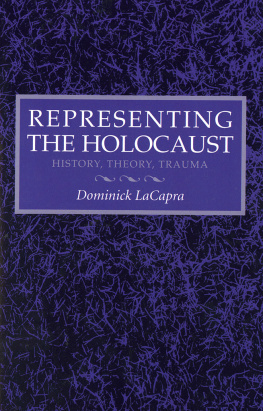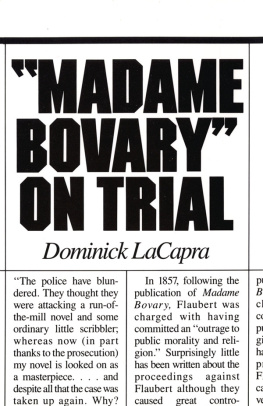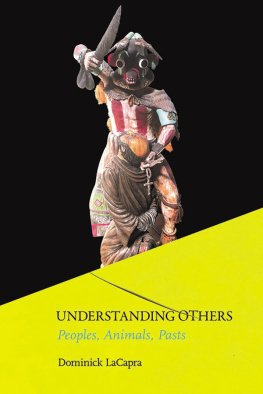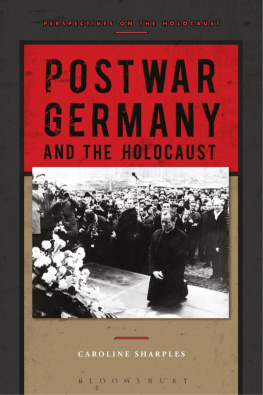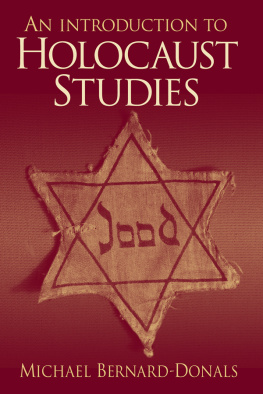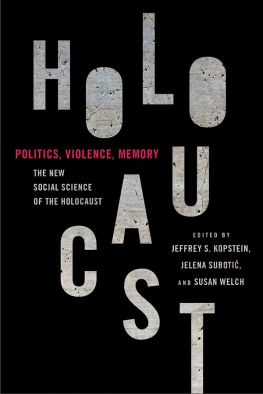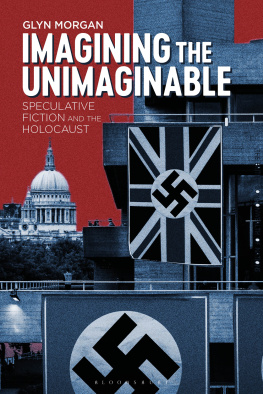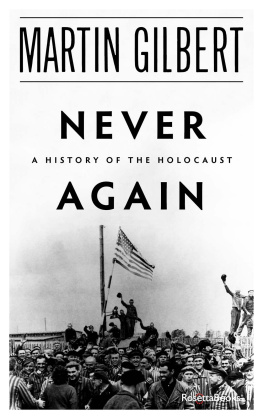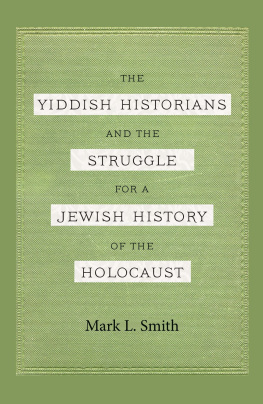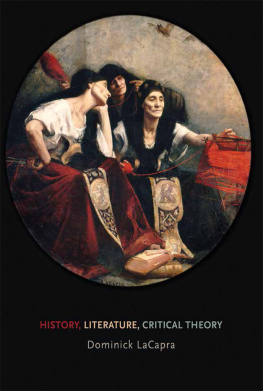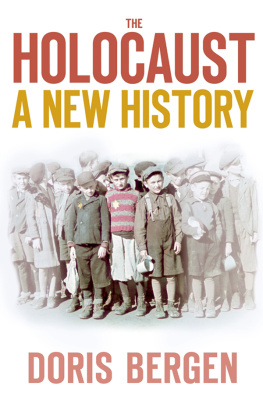HISTORY, THEORY, TRAUMA
REPRESENTING THE HOLOCAUST
Dominick LaCapra
Cornell University Press Ithaca and London
With deepest affection, for Rae, Faye, and Harry
As we already know, the interdependence of the complicated problems of the mind forces us to break off every enquiry before it is completedtill the outcome of some other enquiry can come to its assistance.
Sigmund Freud, Mourning and Melancholia
The Holocaust threatens a secular as well as a religious gospel, faith in reason and progress as well as Christianity. It points, in that sense and that sense only, to a religious upheaval. It challenges the credibility of redemptive thinking....
Our sefer hashoah [the response to the missing Book of Destruction commissioned from seventy elders by a king who made himself sick reading and reading, and decreed that there be no more accounts of the destruction] will have to accomplish the impossible: allow the limits of representation to be healing limits yet not allow them to conceal an event we are obligated to recall and interpret, both to ourselves and those growing up unconscious of its shadow.
Geoffrey H. Hartman, The Book of Destruction
CONTENTS
PREFACE
In the recent past, history and theory have often been construed as mutually exclusive (or at least as necessarily divergent) approaches to problemsfor example, in terms of the binary opposition that correlates history with diachrony and theory with synchrony. Critical of the unmediated application of such a stark opposition in defining research as well as of its implications for understanding history, I insist instead on an active, sustained, and critical interaction between theoretical reflection and historical investigation, and I try to bring this insistence to bear on the problem of representing the Holocaust. Only through such an interaction can history and theory pose mutually provocative questions.
The Holocaust has been both repressed and canonized in the recent past, and it often functions as a more or less covert point of rupture between the modern and the postmodern. Careful inquiry into it may reveal often concealed aspects of the genealogy of various postmodernisms and poststructuralisms, and it may also help to provide a different way of seeing and raising questions about certain pronounced tendencies in contemporary thought, such as the near fixation on the sublime or the almost obsessive preoccupation with loss, aporia, dispossession, and deferred meaning. Moreover, such an inquiry prompts one to ask whether psychoanalysis, which has recently met with a variety of responses ranging from subtle rethinking to extreme condemnation, should itself be understood not primarily as a psychology of the individual or as the basis for a generalized therapeutic ethos but as an inherently historicized mode of thought intimately bound up with social, political, and ethical concerns.
Making a specific use of psychoanalysis, I investigate the transferential relation between the historian or theorist and the object of analysis. Victims of severely traumatizing events may never fully escape possession by, or recover from, a shattering past, and a response to trauma may well involve acting-out (or emotionally repeating a still-present past) in those directly affected by it and at least muted trauma in attentive analysts and commentators. While thoroughly acknowledging these important considerations, I maintain that what Freud termed working-through has received insufficient attention in post-Freudian analysis, and I stress the importance of working through problems in a critical manner. I also suggest that a vital question for present interpreters of such figures as Heidegger is how to situate dubious, symptomatic, at times insensitive or insufficiently empathic aspects of their work while distinguishing and elaborating further valuable, critical dimensions in an active engagement with the past. How, in other words, may one eschew rewriting or apologetically glossing history yet brush [it] against the grain (in Walter Benjamins phrase) to recover different possibilities for the present and future? And how may this be accomplished in a secular historiography or criticism that distinguisheswithout totally dissociatingitself from religion or theology and employs the weak messianic power of values not projectively to refigure or redeem the past but to prompt inquiry into it that critically confronts explicit normative issues?
In the course of the following chapters, I also address the role of canons in various disciplines, the import of noncanonical readings of canonized texts, and the relation between canons and problems (such as those posed by the Holocaust) that cannot be reduced to questions of canonicity. I endeavor to place in a different perspective such specific, controversial issues as the historians debate over ways of representing the Shoah, the attempt to historicize extreme events, responses to the discovery of Paul de Mans World War II journalism, the implications of Heideggers Nazi tum for the reading of his texts, and the role of Holocaust testimonies in historical interpretation. Throughout there is an emphasis on basic issues in historical inquiry and self-understanding that should be of interest not only to historians but also to philosophers, literary critics, and social scientists for whom the problem of history has recently become a renewed concern. Versions or parts of certain chapters appeared in the following places: parts of the Introduction in the American Historical Review 97 (1992); a version of Chapter 1 in the Intellectual History Newsletter 13 (1991) and substantially its present form in Lloyd Kramer, Donald Reid, and William Barney, eds., Learning History in America: Schools, Cultures, and Politics (Minneapolis: University of Minnesota Press, 1994); a version of Chapter 2 in Saul Friedlander, ed., Probing the Limits of Representation: Nazism and the Final Solution (Cambridge: Harvard University Press, 1992); a version of Chapter 3 in New German Critique 53 (1991); and Chapter 4 in History and Memory 4 (1992). Chapters 5, 6, and 7 are published here for the first time.
In closing, I want to acknowledge Carol Betsch, of Cornell University Press, and Victoria Haire, for their excellent editorial assistance. I also thank Kathleen Merrow for her assistance in preparing the Index.
DOMINICK LACAPRA
Ithaca, New York
INTRODUCTION
The general concern of the following chapters is the relation between history and theory, while the leitmotif (and often the specific focus) is the difficult question of how to address issues bearing on the Holocaust or Shoah. Virtually everything in the book pertains to the problem of historical understanding. It may be useful to observe at the outset that by theory I mean sustained critical and self-critical reflection addressed to practices, texts, or sets of facts. Ideally, such reflection increases self-understanding and provides a measure of critical distance on problems without implying a denial of ones implication in them. It also tests (or contests) existing formulations and may indicate the need for more desirable modes of articulation (even when the theorist is able to provide only components or indications rather than fully developed paradigms of the latter).
The first chapter tries to reformulate the problem of reading canons, and it extends the notion of significant texts beyond the purview of high or elite culture. The Holocaust or Shoah is of course a problem that itself requires a mode of inquiry not confined to classically canonical texts although this problem certainly encompasses the issue of the role of certain of these texts with respect to it. It is in a sense a problem that has itself been both avoided or repressed and in certain ways canonized in the recent pasta problem that should be a concern of both history and critical theory but whose understanding often poses seemingly insuperable obstacles or holds out dubious temptations to the historian and theorist. The bulk of this book is devoted to recent representations or uses of the Holocaust in history and theory as well as to debates concerning the pertinent writings of major theorists such as Paul de Man and Martin Heidegger. Only in the chapter on Heidegger, however, do I address directly and in a sustained fashion certain issues raised in the first chapter on canons, to wit, the extent to which canonized texts are symptomatic, critical, and potentially transformative with respect to their relevant contexts of production and reception or use. Since so much of the book is addressed to specific matters pertinent to the Holocaust or Shoah, I would herewithout simply losing sight of these matterslike to devote some attention to the preliminary, more general question of the relation between theory and historya question often implicitly at issue in the following chapters. (Readers who are not interested in this type of question might consider going directly to the first chapter.)

